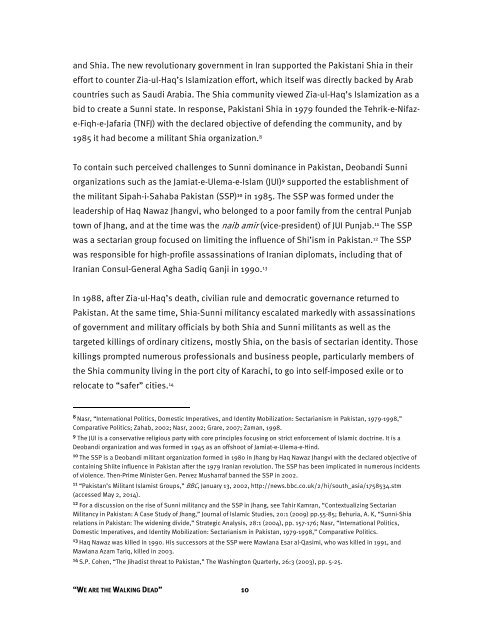pakistan0614_ForUplaod
pakistan0614_ForUplaod
pakistan0614_ForUplaod
Create successful ePaper yourself
Turn your PDF publications into a flip-book with our unique Google optimized e-Paper software.
and Shia. The new revolutionary government in Iran supported the Pakistani Shia in their<br />
effort to counter Zia-ul-Haq’s Islamization effort, which itself was directly backed by Arab<br />
countries such as Saudi Arabia. The Shia community viewed Zia-ul-Haq’s Islamization as a<br />
bid to create a Sunni state. In response, Pakistani Shia in 1979 founded the Tehrik-e-Nifaze-Fiqh-e-Jafaria<br />
(TNFJ) with the declared objective of defending the community, and by<br />
1985 it had become a militant Shia organization. 8<br />
To contain such perceived challenges to Sunni dominance in Pakistan, Deobandi Sunni<br />
organizations such as the Jamiat-e-Ulema-e-Islam (JUI) 9 supported the establishment of<br />
the militant Sipah-i-Sahaba Pakistan (SSP) 10 in 1985. The SSP was formed under the<br />
leadership of Haq Nawaz Jhangvi, who belonged to a poor family from the central Punjab<br />
town of Jhang, and at the time was the naib amir (vice-president) of JUI Punjab. 11 The SSP<br />
was a sectarian group focused on limiting the influence of Shi’ism in Pakistan. 12 The SSP<br />
was responsible for high-profile assassinations of Iranian diplomats, including that of<br />
Iranian Consul-General Agha Sadiq Ganji in 1990. 13<br />
In 1988, after Zia-ul-Haq’s death, civilian rule and democratic governance returned to<br />
Pakistan. At the same time, Shia-Sunni militancy escalated markedly with assassinations<br />
of government and military officials by both Shia and Sunni militants as well as the<br />
targeted killings of ordinary citizens, mostly Shia, on the basis of sectarian identity. Those<br />
killings prompted numerous professionals and business people, particularly members of<br />
the Shia community living in the port city of Karachi, to go into self-imposed exile or to<br />
relocate to “safer” cities. 14<br />
8 Nasr, “International Politics, Domestic Imperatives, and Identity Mobilization: Sectarianism in Pakistan, 1979-1998,”<br />
Comparative Politics; Zahab, 2002; Nasr, 2002; Grare, 2007; Zaman, 1998.<br />
9 The JUI is a conservative religious party with core principles focusing on strict enforcement of Islamic doctrine. It is a<br />
Deobandi organization and was formed in 1945 as an offshoot of Jamiat-e-Ulema-e-Hind.<br />
10 The SSP is a Deobandi militant organization formed in 1980 in Jhang by Haq Nawaz Jhangvi with the declared objective of<br />
containing Shiite influence in Pakistan after the 1979 Iranian revolution. The SSP has been implicated in numerous incidents<br />
of violence. Then-Prime Minister Gen. Pervez Musharraf banned the SSP in 2002.<br />
11 “Pakistan’s Militant Islamist Groups,” BBC, January 13, 2002, http://news.bbc.co.uk/2/hi/south_asia/1758534.stm<br />
(accessed May 2, 2014).<br />
12 For a discussion on the rise of Sunni militancy and the SSP in Jhang, see Tahir Kamran, “Contextualizing Sectarian<br />
Militancy in Pakistan: A Case Study of Jhang,” Journal of Islamic Studies, 20:1 (2009) pp.55-85; Behuria, A. K, “Sunni-Shia<br />
relations in Pakistan: The widening divide,” Strategic Analysis, 28:1 (2004), pp. 157-176; Nasr, “International Politics,<br />
Domestic Imperatives, and Identity Mobilization: Sectarianism in Pakistan, 1979-1998,” Comparative Politics.<br />
13 Haq Nawaz was killed in 1990. His successors at the SSP were Mawlana Esar al-Qasimi, who was killed in 1991, and<br />
Mawlana Azam Tariq, killed in 2003.<br />
14 S.P. Cohen, “The Jihadist threat to Pakistan,” The Washington Quarterly, 26:3 (2003), pp. 5-25.<br />
“WE ARE THE WALKING DEAD” 10


